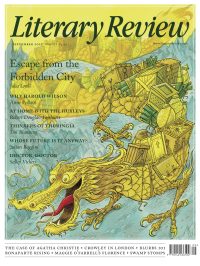Philip Parker
Ghost of the Kingly Raven
Lost Realms: Histories of Britain from the Romans to the Vikings
By Thomas Williams
William Collins 432pp £25
The history of Britain in the period following the collapse of Roman rule is not for the faint-hearted. Those seeking certainty had better divert their gaze to later times – perhaps to the comforting triumphalism of the Anglo-Saxon Chronicle’s account of Wessex’s rise to power, populated with figures of reassuring solidity such as Alfred the Great and Athelstan. Or, failing that, they should cling tight to histories of the big players of the Anglo-Saxon world, the kingdoms of Northumbria, Mercia and Wessex, for which coherent political narratives can more readily be constructed.
In Lost Realms, Thomas Williams eschews such well-trodden paths, turning instead to ‘scraps of legend and ambiguous archaeological traces’ to tell ‘the stories of the most obscure kingdoms to have risen in Britain in the dim post-Roman dawn’. These are the marginalia of history. The histories of these kingdoms can be assembled only from overlooked fragments and half-forgotten whispers. Their shadowy rulers, with their penchant for ‘weapons and glassware, drinking horns and gaming pieces’, lived in the three hundred years or so from the mid-fifth century on, a time for which sources are few. Of one of these will-o’-the-wisp states, situated somewhere around modern Yorkshire, Williams notes, ‘by the time anyone wrote of Elmet it was already gone’. The realm is now recalled in just a few place names, an inscription on a standing stone and a few Welsh poems, including Y Gododdin, which mentions a certain Madog, a warrior from Elmet, who perished in battle against the invading Anglo-Saxons.
Recovering the histories of such kingdoms as Dumnonia (in modern Devon and Cornwall), Hwicce (in Worcestershire and Gloucestershire) or Rheged (most likely in Cumbria or Galloway – no one can be entirely sure) is a daunting task. It requires the study of a wide variety of sources, from

Sign Up to our newsletter
Receive free articles, highlights from the archive, news, details of prizes, and much more.@Lit_Review
Follow Literary Review on Twitter
Twitter Feed
Under its longest-serving editor, Graydon Carter, Vanity Fair was that rare thing – a New York society magazine that published serious journalism.
@PeterPeteryork looks at what Carter got right.
Peter York - Deluxe Editions
Peter York: Deluxe Editions - When the Going Was Good: An Editor’s Adventures During the Last Golden Age of Magazines by Graydon Carter
literaryreview.co.uk
Henry James returned to America in 1904 with three objectives: to see his brother William, to deliver a series of lectures on Balzac, and to gather material for a pair of books about modern America.
Peter Rose follows James out west.
Peter Rose - The Restless Analyst
Peter Rose: The Restless Analyst - Henry James Comes Home: Rediscovering America in the Gilded Age by Peter Brooks...
literaryreview.co.uk
Vladimir Putin served his apprenticeship in the KGB toward the end of the Cold War, a period during which Western societies were infiltrated by so-called 'illegals'.
Piers Brendon examines how the culture of Soviet spycraft shaped his thinking.
Piers Brendon - Tinker, Tailor, Sleeper, Troll
Piers Brendon: Tinker, Tailor, Sleeper, Troll - The Illegals: Russia’s Most Audacious Spies and the Plot to Infiltrate the West by Shaun Walker
literaryreview.co.uk